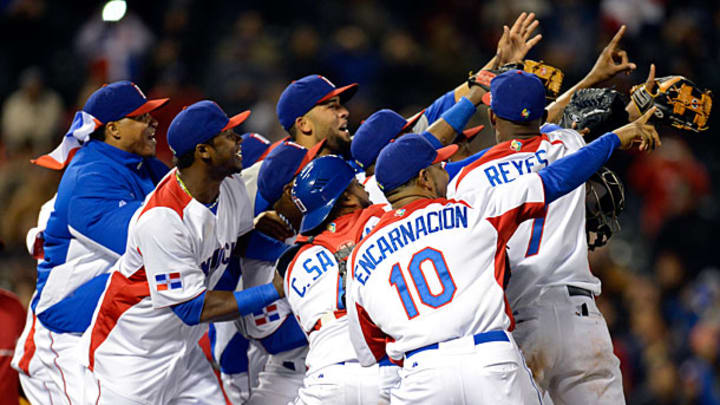Dominican Republic has edge against Puerto Rico in WBC final

The Dominican Republic team has known nothing but celebrations in the WBC, going 7-0 heading into tonight's title game. (Getty Images)

By Cliff Corcoran
The Dominican Republic will attempt to become the first team to go undefeated in a World Baseball Classic on Tuesday night as it takes on giant-killer Puerto Rico in the tournament final at San Francisco’s AT&T Park. This is the first WBC final for either team. Prior to this year, the Dominican Republic’s deepest run came in 2006, when it lost to Cuba in the semifinals, while Puerto Rico had been eliminated in the second round in each of the two previous iterations of this tournament.
Puerto Rico arrives in the final with a 5-3 record in the tournament having previously delivered finishing blows to tournament favorites Venezuela (in Round 1), the United States (in Round 2) and Japan (in the semifinals). However, its two previous confrontations with the Dominican Republic in this tournament both resulted in losses (4-2 in Round 1, 2-0 in Round 2). Neither of the two previous meetings between these two teams had particularly high stakes. In both cases, both teams had already advanced and were, in effect, playing for seeding. In Tuesday night’s game, however, the stakes couldn’t be higher as the winner will become just the second nation ever to claim a WBC championship after two-time winner Japan.
By virtue of having the higher seed in the final four, the Dominican Republic will be the home team on Tuesday night, but it will also be a man short in the bullpen as reliever Kelvin Herrera threw 32 pitches in Monday night’s 4-1 semifinal victory over the Netherlands; WBC rules state that any pitcher who throws 30 or more pitches in a game cannot pitch the next day. Fortunately for the Dominicans, the quality and depth of their bullpen is one of their greatest strengths. Even without Herrera, they’ll still have an outstanding end-game with righties Fernando Rodney, Pedro Strop, Santiago Casilla and Octavio Dotel, who have thus far combined for 21 2/3 scoreless innings in this tournament. The Dominican bullpen as a whole has thrown 21 2/3 consecutive scoreless frames.
Having a bullpen that strong and deep takes some of the pressure off of Dominican starter Samuel Deduno, a 29-year-old righty currently on a minor league deal with the Twins. Deduno was outstanding in the D.R.’s victory over the United States on Thursday, using a devastating curveball to strike out seven men in four innings while allowing just one run to the most powerful lineup in the tournament. Throw in his Round 1 victory over the overmatched Spanish team, and Deduno has struck out 12 men in eight innings in this tournament while allowing just the one run and, perhaps most impressively given his history of control problems, walking just two.
Deduno’s mound opponent in this game will be 35-year-old righty Giancarlo Alvarado, who has spent the last three seasons pitching in Japan, most recently with the Yokohama BayStars, going 12-21 with a 3.53 ERA in 45 starts and one relief appearance over those three seasons. Like Deduno, Alvarado sailed through Spain’s weak lineup in Round 1 (4 IP, 1 H, 0 BB, 4 K), but he had a tougher time with the surprising Italian team in Round 2, allowing three runs (two earned) in 4 1/3 innings in a game that saw Puerto Rico come within five outs of elimination.
There’s no question that the undefeated Dominicans are the favorite here. Not only have they already defeated Puerto Rico twice, but they have a clearly superior roster. There’s no way not to give the D.R. the edge in the starting pitching matchup, the bullpen and the lineup heading into Tuesday night’s final, but Puerto Rico has gotten to this point by overcoming such apparent inequities.
The key to Puerto Rico’s underdog success has been catcher Yadier Molina, who has made the most of a pitching staff utterly lacking in star power (only lefty relievers Xavier Cedeño and J.C. Romero appeared in the major leagues last year, and Romero has yet to catch on with a team for the coming season). By placing total trust in Molina, executing the pitches he has called, and keeping the pace he has set, the Puerto Rican pitchers have managed to keep the best offenses in the tournament off-balance. In its last three games, Puerto Rico has faced Japan, the Dominican Republic and the United States and held them to a grand total of six runs, or two runs per game. Against the U.S. in their double-elimination rematch in Round 2, that was achieved via veteran junkballer Nelson Figueroa’s assortment of slow breaking pitches. In its semifinal against Japan, it was achieved by accelerating the pace of the game and preventing the deliberate Japanese hitters from getting comfortable at the plate.
As was the case against the U.S., Molina has the advantage of familiarity with the bulk of the Dominican lineup, which, save for the minor leaguer in leftfield (Ricardo Nanita, Moises Sierra or Eury Perez), is comprised entirely of veteran major leaguers. That doesn’t make an Alvarado versus Robinson Cano confrontation any less frightening for Puerto Rico, but there’s a big difference between Alvarado trying to survive such a match-up on his own versus doing so with Molina’s guidance and guile.
